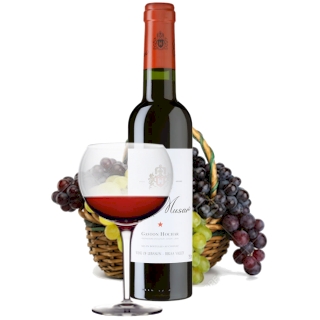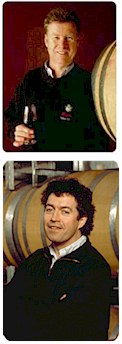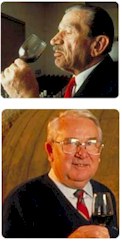


Dr Christopher Rawson Penfold was born in 1811, the youngest of 11 children. He studied medicine at St Bartholomew's Hospital, London, graduating in 1838. Like many doctors before and since, Dr Penfold had a firm belief in the medicinal value of wine. Before he left Britain he had obtained vine cuttings from the south of France and these were planted around the site of the modest stone cottage he built with his wife, Mary, at Magill on the outskirts of Adelaide in 1845. The couple called this house The Grange, after Mary's home in England.

Dr Penfold built up his medical practice and made fortified wines - port and sherry - for his patients. As the demand for their wine grew, the Penfolds expanded the vineyards and increased production.
Following Dr Penfold's death in 1870, the vineyards and winery continued to be very capably run by Mary Penfold, who had been fundamental in their establishment and development from the very beginning. The scale of Mary's success some 35 years after the company's small beginnings, is indicated by records showing that 107,000 gallons (close to 500,000 litres) of wine were stored at Magill in 1881. This quantity was said to represent one-third of all wine stored in South Australia at the time. By the turn of the century, the area under vine at Magill had grown to 50 ha (120 acres) and Penfolds was fast becoming a household name.
As well as the Magill vineyard surrounding the original winery, there are Penfolds vineyards in the Barossa Valley, home of the world renowned Kalimna and Koonunga Hill vineyards. Vineyards are also owned in the Clare Valley, the Eden Valley (higher up and adjacent to the Barossa), McLaren Vale just south of Adelaide, and in Padthaway and Coonawarra in the far south-east of the state. Grapes are also purchased under long-term contracts from all premium areas in South Australia. Additionally the company has developed vineyards and growers in the emerging premium wine regions of Robe and Bordertown.

The Magill Vineyard is Penfolds spiritual home, the site where Penfolds Wines was founded in 1844. Since the 1970s the land has been subject to the pressures of urban development and today just 5.2 ha (12.5 acres) of Shiraz vines remain, surrounding the Grange cottage. The grapes are used to produce Magill Estate Shiraz, the only wine still produced at the historic Magill winery.
The soil is fertile red-brown earth and the climate is generally warm. The oldest vines were planted in 1951 and the most recent in 1985. On average the Magill Vineyard yields about 40 tonnes of grapes. Kalimna is mostly planted to Shiraz and Cabernet, and produces the base, or motherwine, for Grange. The vineyard is located at the northern end of the Barossa, 4km (2.5 miles) north of Nuriootpa. The mature parts of the Kalimna vineyard were planted in the 1940s and 1950s.
There are gnarled, century-old Cabernet vines on the Golf Course Block - also called Block 42 - that sprawl, untrellised, over the ground and provide high-intensity fruit for Bin 707. In 1973 a 30ha block 5km north-east of Kalimna in the Barossa Valley, was selected and purchased by then Penfolds Chief Winemaker Max Schubert. It was planted two-thirds to Shiraz and one-third to Cabernet Sauvignon. The Koonunga Hill vineyard contributes to Penfolds red wines such as Grange, Bin 707 Cabernet Sauvignon, Bin 389 Cabernet, Shiraz, St Henri Shiraz and Kalimna Bin 28 Shiraz. Average yield is between four and six tonnes per hectare or about 1.5 to 2.5 tons per acre.
Penfolds invested in the Clare region, about 130km (80 miles) north of Adelaide, in the-late 1970s, at the recommendation of Max Schubert. The vineyards are now established and contribute to a number of premium wines, including the Penfolds Organic red wine. In Max Schubert, Don Ditter, John Duval and Peter Gago, Penfolds have nurtured four of Australia's great winemakers, who have passed the baton of responsibility for crafting Australia's most famous wines down through the past five decades.
